Personal Analysis: Writer brings attention to anxiety, depression issues in teens
Student photographer Christi Norris uses eggshells to represent the empty feeling those who have depression often describe. “Depression on its own feels as if all of your insides have been scooped out and all is left is an empty shell,” Norris said. Her article about anxiety and depression not only describes what it’s like to live with a mental illness but what resources are available for those who do.
The leaves fell. The sun shone — the perfect autumn day. But for me, this day would hold the first in a series of anxiety-panic attacks that would consume my life in the fall and winter of 2018.
I had arrived at volleyball practice and nearly finished a meeting with our head coach when I began to feel my chest tighten and my airway constrict. The inside of the gym suddenly felt as hot as the middle of the desert, and I knew that I was having a panic attack. I shakily walked to my bag on the side of the gym, dug inside and grabbed my medication, inhaler, and some water. I told my coach I had to step out. I shoved the pills in my mouth, drank some water and took a puff of my inhaler.
Before I could be out the door, I started shaking and crying. I opened the side door to the gym and collapsed onto the concrete walkway outside. My back pressed on the brick wall as I gripped my knees to my chest. My mind focused on the things going wrong in my life and how mad, sad, and terrible I felt.
People walked past me and cast sidelong glances in my direction. They whispered, but no one stopped to help. Every second I spent engulfed in panic felt like an hour. After what seemed like an eternity, my breath began to slow my heart rate lessened. Then, my panic turned into only a faint sob. Just as abruptly as it came, it left, but not without leaving a permanent scar.
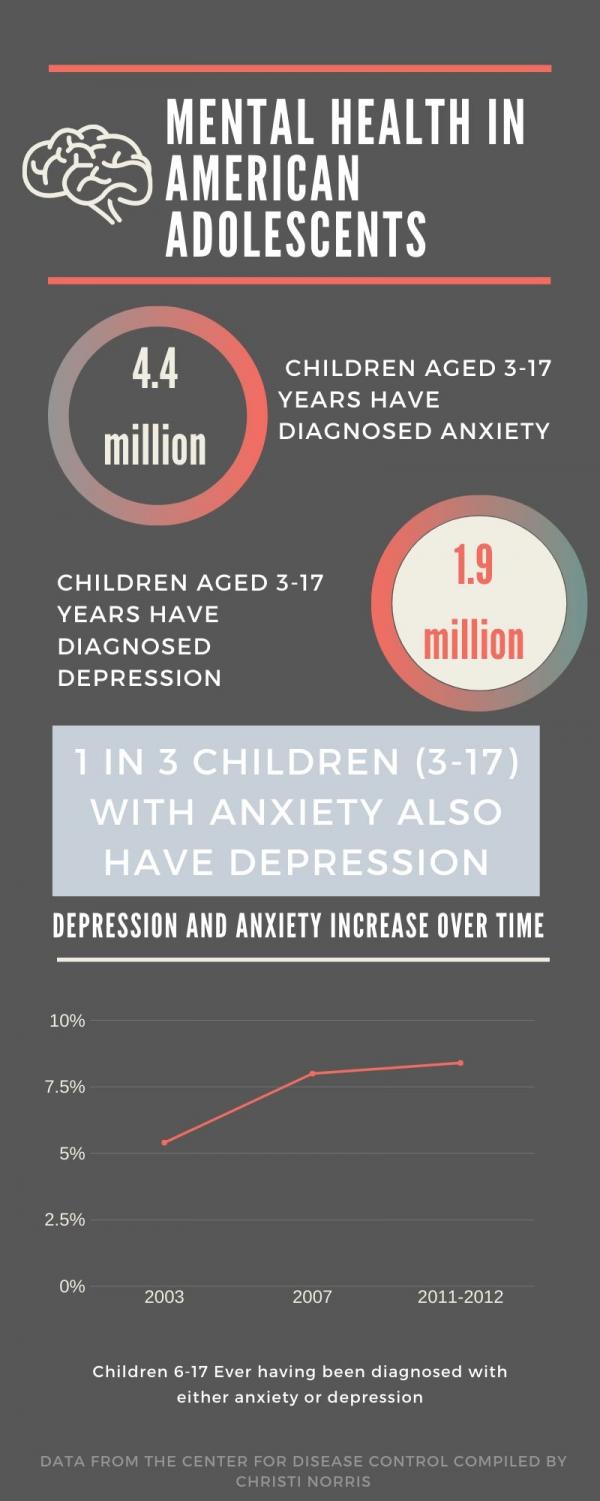
What are Anxiety and Depression?
Anxiety and depression are two different but intertwined mental illnesses that can both originate from several different causes, including environmental factors and genetics.
“Generalized Anxiety Disorder is characterized by persistent and excessive worry about a number of different things. People with GAD may anticipate disaster and may be overly concerned about money, health, family, work or other issues. Individuals with GAD find it difficult to control their worry,” according to information from the Anxiety and Depression Association of America in its article titled Generalized Anxiety Disorder. “They may worry more than seems warranted about actual events or may expect the worst even when there is no apparent reason for concern.”
When it comes to depression, experts make other distinctions.
“Major depression is characterized by at least five of the diagnostic symptoms of which at least one of the symptoms is either an overwhelming feeling of sadness or a loss of interest and pleasure in most usual activities,” according to information from the Anxiety and Depression Association of America in its article titled Depression. “The other symptoms that are associated with major depression include a decrease or increase in appetite, insomnia or hypersomnia, psychomotor agitation or retardation, constant fatigue, feelings of worthlessness or excessive and inappropriate guilt, recurrent thoughts of death and suicidal ideation with or without specific plans for committing suicide, and cognitive difficulties, such as, diminished ability to think, concentrate and make decisions,”
What do Anxiety and Depression really feel like?
Despite the many resources that describe the feelings that those with anxiety and depression face, those facts do not represent what the mental illnesses truly feel like. For me, anxiety on its own feels like you are juggling with three balls and then you are juggling with four, and then six, and then 16, all while balancing a stack of books on top of your head. Anxiety feels like you cannot possibly accomplish all you have to and that something will go wrong at any second. Anxiety offers constant worry and uneasiness.
Depression on its own feels as if all of your insides have been scooped out and only an empty shell remains. Depression paints life in shades of gray, and it drains color from existence. Depression feels like emptiness, loneliness, and sorrow. Together these cruel conjoined twins can consume every thought in your mind until not only do you feel worried about tasks you need to accomplish, but you feel too empty to even attempt to do them. When paired together anxiety and depression can take a terrible toll on the lives of anyone, especially teenagers.
My Experiences
I first began to experience anxiety in the third grade. I lived in Colorado, and every summer without fail the forest fires spread across the state, threatening the lives of not just the trees and animals but the people too. One year a fire crept its way across the state and into the edge of my town. I began to be filled with anxiety to the point where even seeing a forest fire on the news or a lighter on my counter sent me into a full-fledged meltdown. After several of these episodes, my parents got me a therapist who helped me to work through my fear of forest fires.
Shortly after overcoming my anxiety around forest fires, my family moved to Washington state where I would live for the next seven years. A few years later when preparing to transition from elementary to middle school. I began to be racked with anxiety, worrying about everything from not making new friends, and being bullied to having to juggle six classes. When middle school finally came that September, I realized that most of my fears were childish. I did, in fact, make friends and earned impeccable grades. But, my anxiety remained with me.
In middle school, I became a perfectionist. If I got below an A on any assignment, I would cry for hours. I would spend my days worrying about tests and studying constantly. It seemed to me that a letter in the grade book determined my worth. During this time, I not only had anxiety, but I first began to feel the results of depression. I would have days where I didn’t want to leave the house or sit next to anyone on the bus or even eat. I would have days where the gray Washinton skies seemed to be an outward reflection of how I felt. Middle school is hard for everyone but for me, it brought my first experiences of real heartache, pain and grief.
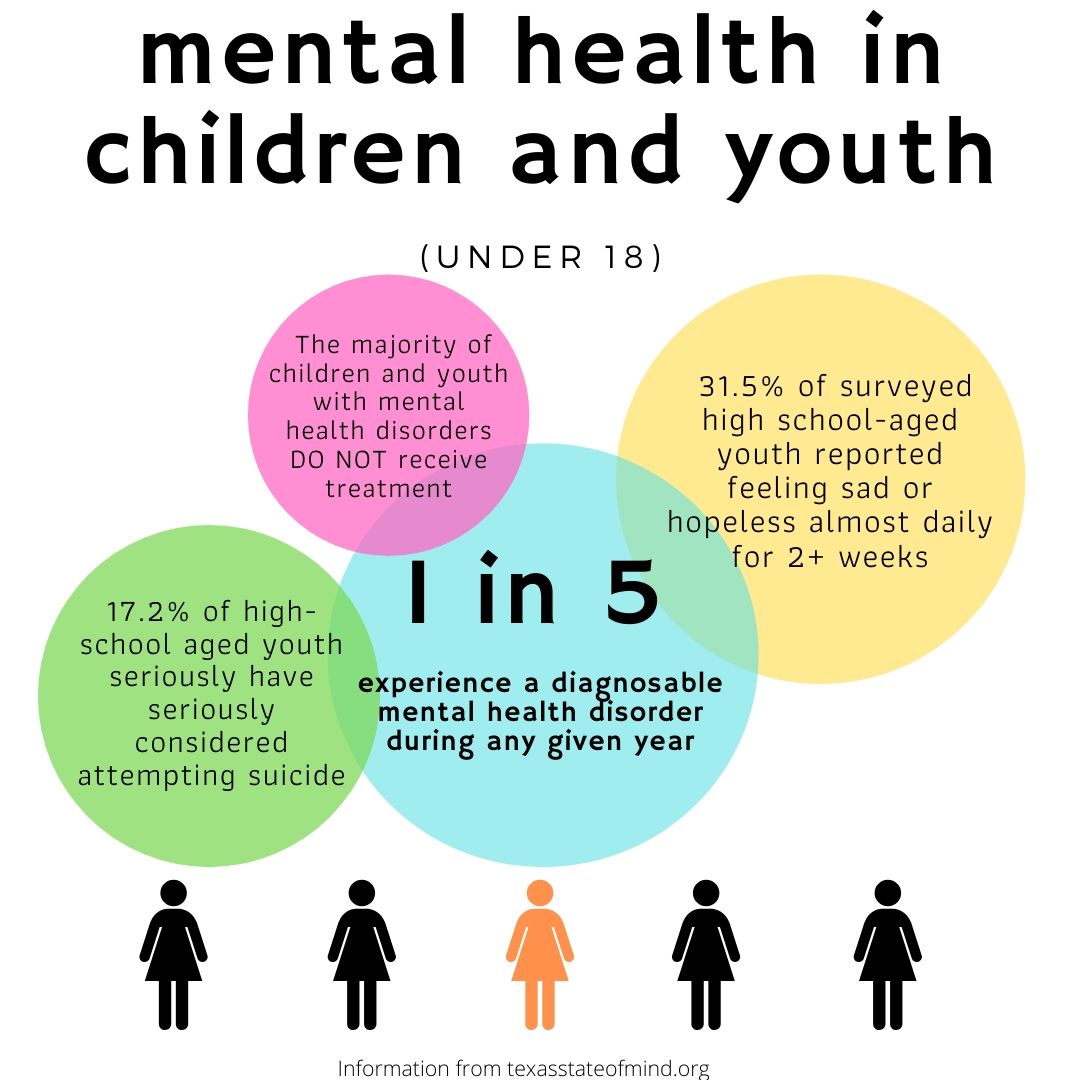
Despite all of the turmoil rolling around in my head, good things still happened and the best things were my friends and family. The people in my life are what I try to remember about middle school. By surrounding myself with good friends, I made it through a hard time. My family had patience with me and took me on new adventures that I will always remember from hikes in the mountains to helicopters in Hawaii. They never ceased showing me the good. My friends added to those good times with walks to the river, the eating of ice cream, and hours of sitting in yards talking. Middle school exposed me to the hard times, but it also showed me the constant, often unseen, presence of good in the world.
I had the exact opposite reaction to high school as I did middle school. Instead of being terrified, I could not wait to move into a new part of life. Although I would be going to school with all of the same people I had for the last three years, life would still change, and I grew excited. I threw myself into the community of my school. I ran and was on the student council. I joined Future Farmers Of America, the Technology Student Association, and I played on the freshman volleyball team in the fall and managed for the wrestling team in the winter. I believed that by making myself as busy as possible that I would be too busy to be anxious or sad. But, I was wrong.
My freshman year became the best and worst year of my short life. I lost all of my friends, but still had to see them every day. I didn’t know how to juggle everything I had put on my own plate. But despite the panic attacks, stress, anxiety, and just plain sadness, I came out the worst year of my life happy. In the beginning, I felt completely alone, hopeless, and anxious. In the end, I felt hopeful, happy and excited. So what happened? As time passed, I realized I had to talk to someone. I talked to my parents, and when I finally made friends, I talked to them. As I let them know what I had been going through, I found that I could let some of it go and cease suffering in silence. I began to find things such as photography and art that allowed me to express myself and feel okay. Slowly, day by day, I moved away from a bad phase and into the good.
I still have a long way to go, but something I’ve learned is that anxiety and depression are things that I will have to live with for possibly the rest of my life, but that they do not define who I am. I am not the only 16-year-old who lives with these mental illnesses, and I am by far not the only person who does. But many people who are coping with anxiety and or depression are not aware that they are not alone. They are suffering in silence, afraid that they will be judged for something they cannot control.
What can I do to help others or myself?
When helping someone with a mental illness like anxiety or depression, it is important to remember that they can’t control the circumstances of their disability. Some people who struggle with mental illness wander in what feels like darkness, often with little control, but with no hope to find the light. But, strategies exist to illuminate a way to lessen the weight of mental illness.
Here’s a list of things that can help people with mental illnesses from the Anxiety and Depression Association of America:
- Take a time-out. Practice yoga, listen to music, meditate, get a massage, or learn relaxation techniques. Stepping back from the problem helps clear your head.
- Eat well-balanced meals. Do not skip any meals. Do keep healthful, energy-boosting snacks on hand.
- Limit alcohol and caffeine, which can aggravate anxiety and trigger panic attacks.
- Get enough sleep. When stressed, your body needs additional sleep and rest.
- Exercise daily to help you feel good and maintain your health. Check out the fitness tips below.
- Take deep breaths. Inhale and exhale slowly.
- Count to 10 slowly. Repeat, and count to 20 if necessary.
- Do your best. Instead of aiming for perfection, which isn’t possible, be proud of however close you get.
- Accept that you cannot control everything. Put your stress in perspective: Is it really as bad as you think?
- Welcome humor. A good laugh goes a long way.
- Maintain a positive attitude. Make an effort to replace negative thoughts with positive ones.
- Get involved. Volunteer or find another way to be active in your community, which creates a support network and gives you a break from everyday stress.
- Learn what triggers your anxiety. Is it work, family, school, or something else you can identify? Write in a journal when you’re feeling stressed or anxious, and look for a pattern.
- Talk to someone. Tell friends and family you’re feeling overwhelmed, and let them know how they can help you. Talk to a physician or therapist for professional help.
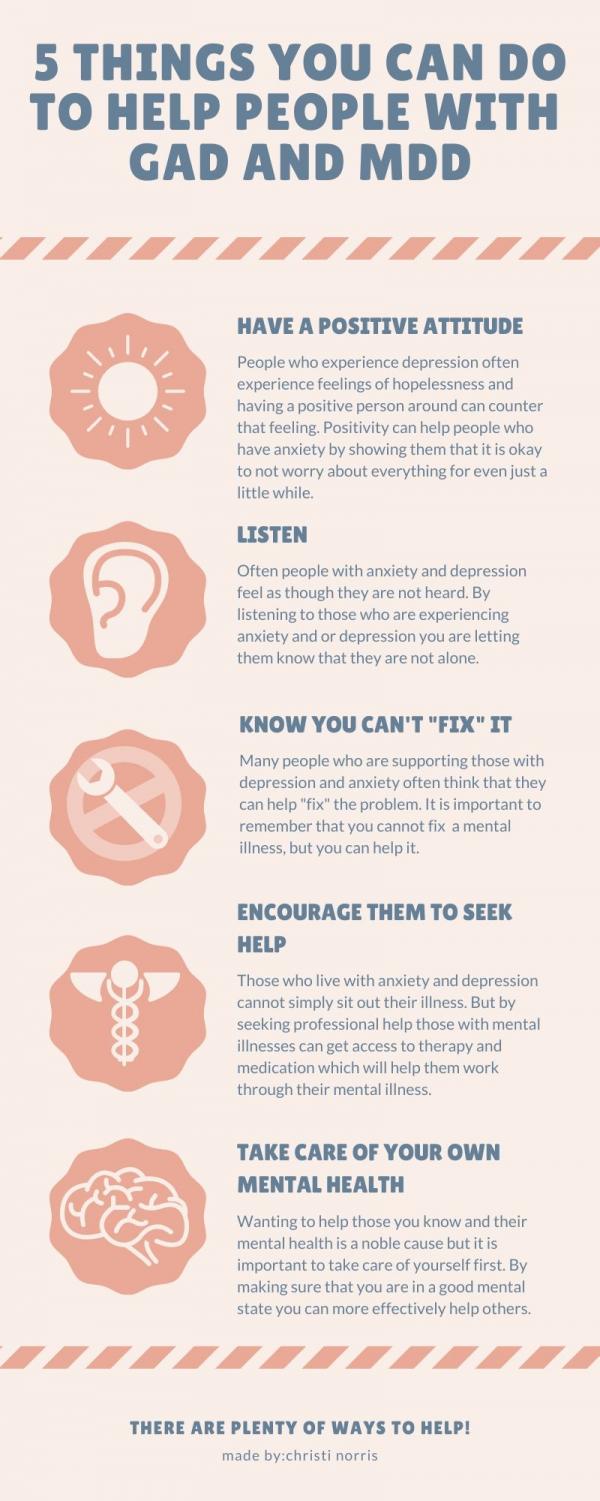
What resources are available for people with anxiety and depression?
- Anxiety and Depression Association of America: ADAA is an association dedicated to the prevention, treatment, and cure of Anxiety, Depression, OCD, PTSD, and other mental illnesses. It offers resources for people with mental illnesses, tips, and much more.
- National Institute of Mental Health: NIMH offers resources for people in crisis and those seeking help. It also has educational information on mental illnesses including information on anxiety during the COVID-19 pandemic.
- Substance Abuse and Mental Health Services Administration: SAMHSA offers a disaster distress helpline that can be reached at 1-800-985-5990. It also offers help to find treatment for those with mental illnesses or substance abuse.
- Mentalhealth.gov: Is dedicated to starting the conversation about mental health and offers resources at the local and national levels. It also provides specific resources for young people with mental health.
- Mental Health America: MHA offers a treatment locator that can help people find a counselor or therapist. They also have national helplines and provide tools for mental wellness.
- TEEN LINE: Teen Line is a hotline for teens to talk to other teens instead of adults. To reach by phone: call (310) 855-HOPE or (800) TLC-TEEN (nationwide toll-free) from 6 pm to 10 pm PST. To reach by text: Text “TEEN” to 839863 between 6:00pm-9:00pm PST.
- National Suicide Prevention Lifeline: (1.800.273.TALK ) Offers support and assistance 24/7 for anyone feeling depressed, overwhelmed, or suicidal.
Your donation will support the student journalists of Prosper High School. Your contribution will allow us to purchase equipment and cover our annual website hosting costs.

Honors & Awards:
2021 Online Tops in Texas 9th place
Dallas Morning News National High School Competition 1st place
Photographer Of The Year Prosper High School 2019-2020, 2020-2021
National Scholastic Press Association (NSPA) Best of Show Awards 4th place podcast
Southern Interscholastic Press Association (SIPA’s) Best Writing Contest 2nd place blog
Interscholastic League Press Conference 2021 Individual Achievement Awards:
1st and 2nd: Photo Slideshow
Honorable Mention: Student Life Photo
3rd: Photo Portfolio
Honorable Mention: Sports Feature Photo
3rd: Sports Action Photo
3rd: Feature Photo
2nd and 3rd: In-Depth News/Feature Package
Interscholastic League Press Conference 2020 Individual Achievement Awards:
Honorable Mention: Photo Slideshow
Honorable Mention: Photo Portfolio





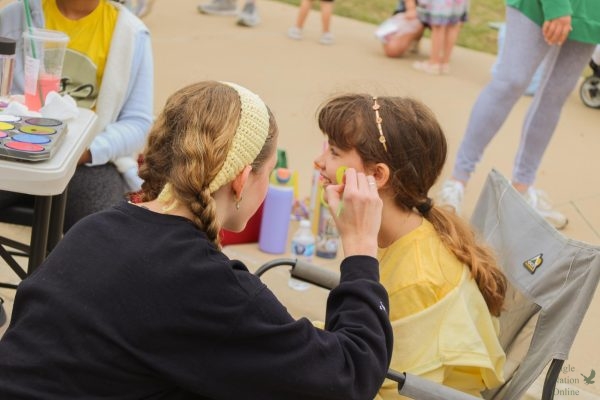


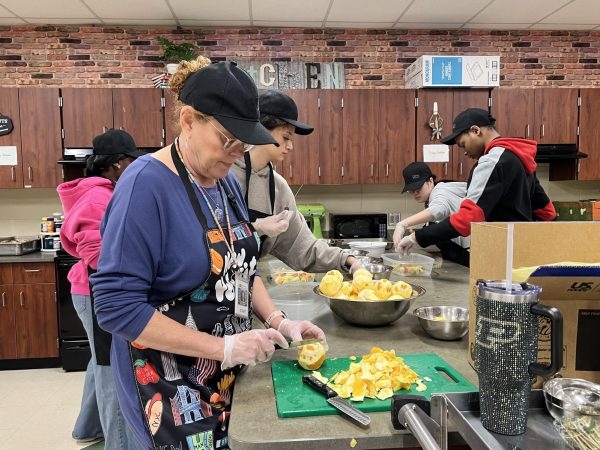
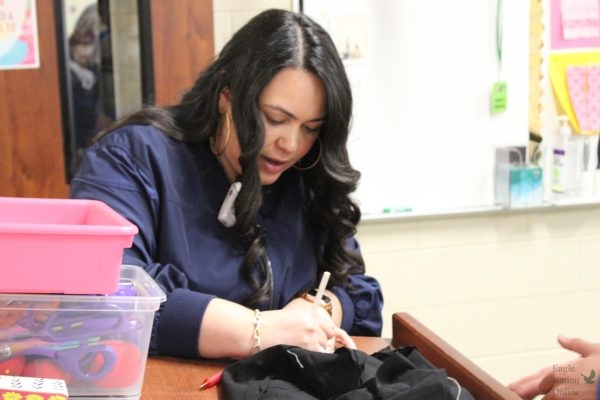






Kristy • May 9, 2020 at 10:30 am
Excellent article. Well written, heart-felt and informative. Thank you for sharing your thoughts and insight.
Ryan Norris • May 7, 2020 at 2:41 pm
As the father of Christi, I have seen this process unfold. Many times I felt helpless and scared for her. She is strong and brave and keeps going even in the tough days. I am very grateful for the many people that have loved and helped her over the years. I am glad she chosen to speak out about her experiences so others could understand and have hope.
Evie • May 2, 2020 at 2:45 pm
This article is amazing. You are such a great writer Christi and I think it’s so cool that you are willing to be vulnerable and share your own experiences. I know I could relate to it for sure. Talking about issues like these help people feel less alone and you are helping break down the stigma of silence. I don’t know if I’d have the guts to do that haha, what an amazing example you are. Love ya <3
Cara Norris • Apr 30, 2020 at 10:00 pm
Thank you for this personal, powerful article!
Meredith • Apr 30, 2020 at 9:02 pm
I think everyone needs to read this article. You did an amazing job of putting in your own experiences, you illustrated perfect the effect of depression and anxiety. Amazing work. I’m so happy to call you my best friend. Love you dearly..
Gina Lasley • Apr 30, 2020 at 8:32 pm
What a terrific article Christi. I believe so many suffer in silence, and know that your honesty and heartfelt words will help many. Such a brave, selfless way to help others.
David Mayhoffer • Apr 30, 2020 at 7:20 pm
Well thought out and well presented. You might find it of worth to note that pretty much all children and adolescents in particular go through periods of mind freezing fear and doubt as they try to find their own place in the world. Most of your ancestors survived and developed functional if not healthy self images. That said It troubles me that too many of young people in our society (two granddaughters included) have haunting needs to be perfect at every thing. At 8 years old they need to have the things their friends have, the cell phones, the looks ,clothes, perfect grades, participate and excel in every sport, and be liked by every one. Your list of remedies (not the best word) shows that you have given a lot of thought to this. Your experiences should be invaluable in helping others negotiate these trials. much of the council from prophets and apostles the past decade or so that deal with these two issues of anxiety and depression give some of the same recommendations. Thank you for your insight.
Amy Gorgueiro • Apr 30, 2020 at 6:45 pm
Such a well-written piece! It’s so hard to be real and raw about such a personal topic. Well done Christi!
Leannah F Baron • Apr 30, 2020 at 10:22 am
This is a well written article. Proud of you, Christi, and am glad you brought the family history/genetic angle in. Very mature insights.
Anne John • Apr 30, 2020 at 10:17 am
What a wonderful, well thought out, article. It all makes so much sense. Thanks for sharing this. Your bravery is going to help so many.
Kathleen Norris • Apr 30, 2020 at 9:37 am
So proud of your bravery and ability to articulate your feelings in a mature and honest way on a complex topic.